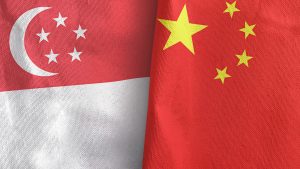Singapore and China will tomorrow begin a joint military exercise, as the city-state seeks to navigate the regional waters roiled by the growing strategic competition between Beijing and Washington.
According to the Singaporean Ministry of Defense, the exercise, which will take place until May 1, will comprise both shore and sea phases, and involve the Royal Singaporean Navy (RSN)’s Formidable-class frigate RSS Intrepid and Bedok-class Mine Countermeasure Vessel RSS Punggol.
“The Republic of Singapore Navy (RSN) conducts regular bilateral and multilateral exercises with foreign navies as part of its ongoing effort to enhance mutual trust and cooperation with other countries,” Channel News Asia quoted the ministry as saying.
China’s People’s Liberation Army Navy will deploy a missile-bearing frigate, the Yulin, and a mine-hunting ship, the Chibi, to the joint maritime exercise which will last from late April to early May, the Chinese defense ministry said in a statement on Monday, according to Reuters.
The joint military drill will be the first since China and Singapore held a combined naval exercise in the South China Sea in September 2021, a move that Chinese state media said “boosted the two navies’ mutual trust and enhanced the level of military cooperation between both countries.”
Since – and indeed, before – the establishment of diplomatic relations in 1990, the primary bond between Singapore and China has been economic, but recent years have seen the two nations establish closer security relations, in line with Beijing’s efforts to increase its military engagement in Southeast Asia. In October 2019, the two countries signed an enhanced defense agreement, an upgrade to the Agreement on Defense Exchanges and Security Cooperation (ADESC) signed in 2008.
The agreement included a number of incremental but significant developments in bilateral security ties, including the establishment of a visiting forces agreement, a mutual logistics support arrangement, and a bilateral defense hotline. It also laid the path for large joint exercises between the two nations’ armed forces and led to the creation of a regular defense ministers’ dialogue, the first of which was convened in June of last year.
This week’s exercise is also a good example of how Singapore is seeking to maintain a balance between China and the U.S. in an era of growing strategic competition. Crucially, this has proceeded despite the various challenges that have arisen in bilateral relations, such as China’s seizure of Singaporean military vehicles returning from an exercise in Taiwan in November 2016, and the city-state’s growing wariness about Beijing’s efforts to cultivate pro-Chinese sentiments among Singapore’s ethnic Chinese population.
Even though the U.S. remains a much closer security partner (just as China is the more proximate economic partner), Singapore’s leaders take pains to match each advancement in this relationship with a counterbalancing step forward in relations with Beijing. As an example, Singapore’s signing of the upgraded ADESC took place just weeks after it renewed a key military agreement with the United States. Likewise, in August of last year, Singapore participated for the first time in the U.S. military’s expanded Super Garuda Shield exercise with Indonesia, to which this current drill with China could be seen as a response of sorts.
All this is to say that Singapore, gifted with Southeast Asia’s most stable and strategic foreign policy establishment, will continue to attempt to situate itself at the delicate midpoint between Washington and Beijing, while counseling both to pull back from the brink.

































